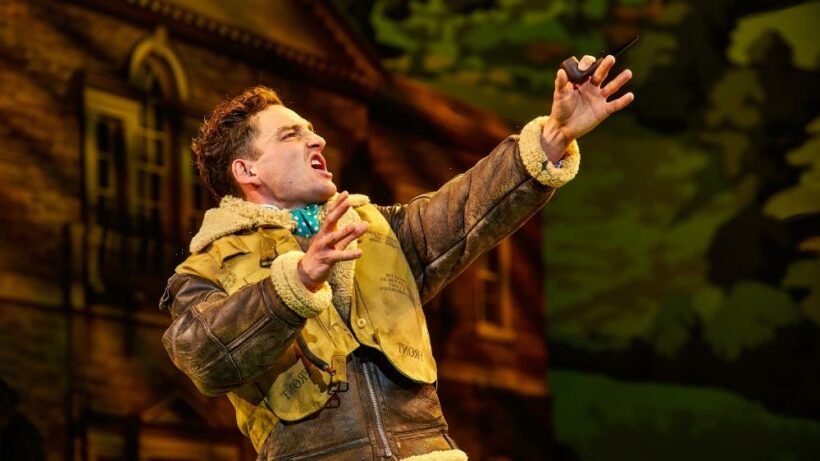No one saw it coming. Reworking Goldoni’s 18th-century comedy “A Servant of Two Masters” didn’t look like the recipe for a transatlantic comedy smash, but that was before Richard Bean turned it into the sensational “One Man, Two Guvnors.” Now teaming up with co-writer Oliver Chris (who played James Corden’s dashing-but-dim master in the earlier hit), Bean is back with another revamp of an old play and London’s National Theatre has high hopes. Shock news: Comedy lighting does strike twice. As the ultra-British 1940s types peopling the farcical plot might put it, “Hurrah!”
Those hopes were literally sky high since Bean and Chris have relocated Sheridan’s 1775 comedy “The Rivals” among a bunch of fighter pilots during World War Two. They have set up camp on the sunlit lawns (via Mark Thompson’s cheerily nostalgic picture-book set) of Malaprop Hall, a stately pile requisitioned by the Royal Air Force yet still overseen by its owner.
Picking up on the Restoration comedy idea of direct audience address and running with it throughout, Mrs. Malaprop, Sheridan’s legendary, matronly mangler of language, opens the proceedings “with faultless electrocution.” Eyeballing the audience, Caroline Quentin tartly observes, “Imelda Staunton was not available. Dame Helen Mirren told casting that she’ll decide when she’s old, thank you very much.”
As in the original, she is guardian to Lydia Languish (a pin-sharp, deliciously self-satisfied Natalie Simpson) who, to save time explaining the insane, disguise-laden plot, is basically beloved by virtually every young man with a pulse (hence the title) but who very much has ideas of her own. “Beefcake,” she exclaims, clapping eyes on the RAF’s swarthy, working-class fitter Dudley Scunthorpe (Kelvin Fletcher). “My favorite kind of cake.”
In Sheridan’s original, Lydia is obsessed with romantic fiction; here she’s not only First Officer, Air Transport Auxiliary, she’s a staunch devotee of new-found feminism rising from women’s wartime emancipation. So far, so correct, except for the ruthlessly, comically exploited fact that Lydia’s devotion to liberation stops well short of her own needs. Equality can go hang when she wants her maid, Lucy, to cater to her needs.
Regarding Lydia’s faux-feminism with a severely arched eyebrow, beady-eyed, sparky Kerry Howard (as Lucy) keeps the audience onside with many an aside about the state of things, not least the plot: “Beautiful rich idiots falling arse over tit in love, and all the bleeding maid gets to do is oil the effing plot delivering love letters to the wrong people.” She does just that, setting in train a typically riotous host of misunderstandings, chiefly but not exclusively amid the beautifully played pilots ranging from virginal, lovelorn Faulkland (Jordan Metcalfe, complete with legs like wet linguine) to James Corrigan’s thunderingly daft Australian pilot Bob “Wingnut” Acres.
They’re led by Laurie Davidson in the title role in a strikingly assured National Theatre debut. Going from gung-ho self-assurance to wide-eyed desperation, he’s exhilaratingly alive to rapid mood-switches and his rocketing sense of excitement is simply infectious.
As his stakes rise, so does the already high level of ridiculousness powered by line-by-line laughs and the fiercely well-timed comedy of the entire company, not least Quentin’s much built-up role with ever-increasing levels of silly smut in her malapropisms. (Admiring her garden, she confuses clematis and clitoris.) And then there’s magnificently stuffed-shirted Peter Forbes — “Be quiet! I’m shouting!” — as Major General Sir Anthony Absolute who, awards judges take note, pulls off the astounding trick of being absolutely and perfectly furious while being astonishingly truthful.
Relocating the play to the Battle of Britain is no random choice. Being a young pilot at the time was a matter of life and death, and facing imminent death daily meant far less time for courtship. The consequent rising stakes are ideal for comedy. Better yet, the show doesn’t flinch from the tragic undertow with two bravura, extended video sequences combining the stiff upper-lippery of it all with its often fatal consequences.
All of this, not to mention composer Paul Englishby’s roof-raising company jitterbug number, is immaculately meshed in director Emily Burns’ perfectly paced, ideally calibrated production. That it’s in the giant, hard-to-control space of the Olivier, and that it’s also her National Theatre debut, makes it yet more impressive.
The show cannot deliver the same level of pure hysteria as “One Man, Two Guvnors,” not least because the plot doesn’t pivot around one knockout role. Instead, the authors have generously added delight by spreading the comedy gifts more widely. They also, as their unexpected ending touchingly shows, have given the production what “One Man, Two Guvnors” didn’t manage: true heart.
Like most theaters recovering from COVID, the National has been in serious need of a knockout hit. They now have one.
Read More About:
Source: Read Full Article
